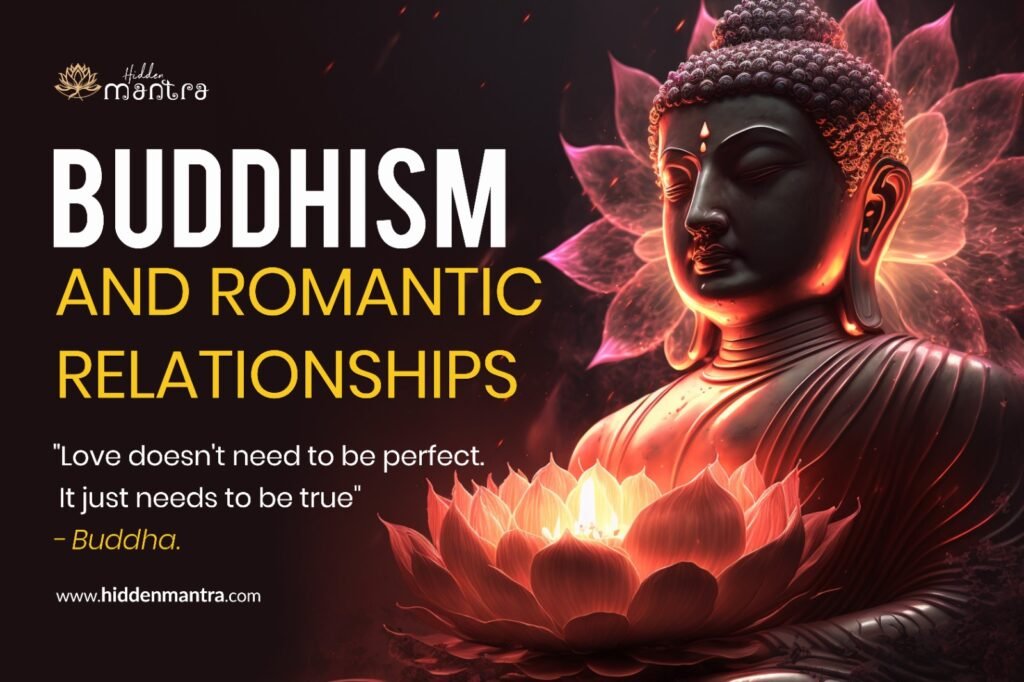“Love doesn’t need to be perfect. It just needs to be true” – Buddha.
The concept of Buddhism always gave us a picture of ascetics, yogis, and monasteries. When you see the title of this blog,’Buddhism and Romantic Relationships‘, some of you may wonder what Buddhism can do with Romance because its main principles are karma, rebirth, and impermanence. In our previous blog, “Buddhist Wisdom on Relationships,” we already saw how much Buddhist philosophy can solve any human relationship hurdles. So, in this blog, I am solely focusing on the Buddhist view of romantic love.
Buddhist Principles in Romantic Relationships
Most people are unaware of the concepts of Buddhism and romantic relationships.. When we think about romantic relationships, the first image that comes to our mind is rosy things. The rosy things are part of the relationship, but everything in our world comes with an expiration date. That’s when Buddhist views on romantic love give new insights and perspectives to our relationship and life.
We all knew a perfect couple having a lovely relationship running for years. We feel envy towards them and are busy judging them and labeling them as ‘lucky.’ ‘There is no secret path to a successful relationship. Being in a relationship and maintaining a relationship is entirely different. I will break that down for you: just because you are in a relationship with someone doesn’t mean you have a healthy relationship. A healthy romantic relationship results in the positive growth of two people, and it demands energy and effort.
Sometimes, one person in the relationship can find out the odds early and try to solve it without a real conversation. Sometimes, it sounds like an outburst and ends in an even bigger disaster. Every romantic relationship is different according to the character and perspective of the people in it. Problems will arise, and how we deal with them is crucial. Here, I am helping you solve your relationship issue by using the philosophy of Buddhism. Let’s see the three major Buddhist principles that can be applied in romantic relationships.
Mindfulness
Mindfulness is one of the essential concepts in Buddhism that helps people attain inner peace and enlightenment. The mindfulness approach to romantic relationships demands being in the present state of the relationship by enjoying every moment without judging.
Most of the problems in a relationship arise when the other partner is too judgemental about the partner’s feelings or emotions. It is easy to judge and hard to be judged. We all know the golden rule of a relationship is communicating. Keeping a preconception about your partner or their decisions can only harm your relationship. Practicing mindfulness helps to maintain a healthy relationship with your partner.
Compassion
We all know that every relationship, including romantic ones, will also undergo a phase of suffering. In Buddhism, compassion refers to one’s approach to eliminating the state of suffering from oneself and one’s partner.
Once your relationship hits the suffering phase, returning to a healthy state takes energy and effort. Here comes the importance of applying four noble truths of love to tackle it. By recognizing suffering, identifying reasons, realizing the truth of the end of suffering, and ultimately following the eight noble paths to end suffering, you can avoid suffering in your relationship. If you want to know the four noble truths of love and how to apply them in real life, read our latest blog, ‘Buddhist Wisdom on relationships’.
Non-attachment
We all realize that we must face suffering when we are in a relationship. One of the best ways to avoid this is by the non-attachment concept of Buddhism. When we are in a relationship, we get attached, and the first thing we always do is try to control the partner. Controlling your partner leads to chaos and, ultimately, to suffering. Here, the non-attachment approach teaches you the lesson of letting go. Some may think that it is like detachment, but it is not. Instead, it deals with the fact of independence and interdependence. Love is not about controlling your partner. It is all about giving them the space to grow and become who they want to be. If you exert your power on your partner, it only ends up in fights because one must be aware that your partner has their individuality, even within a relationship. Practicing the non-attachment philosophy of Buddha will help you lead a meaningful relationship.
Buddhist View on Romantic Love
In the twenty-first century, the definition of love is different, and people approach it differently. Some may believe that love is an emotion and that we can’t make a set of rules to work. In reality, people misinterpret and do narcissistic and toxic things to their partner and call that ‘love’ in pride.
Popular culture sometimes gives wrong guidelines to the people. Many people have no idea they are in a toxic relationship, or some don’t know they are toxic to their partner.
How can we find out if your relationship is on the right track? Or if not, what is the right track, and how can we shift it into the right one?
Let’s look at the Buddhist view on romantic love. Thich Nhat Hanh, the renowned Zen Buddhist monk introduced four components of true love:
- Loving Kindness (Maitri): This element of true love has the power to generate happiness. When you love someone, you focus on creating happiness for them and yourself. It can be a gesture of caring or a cute surprise.
- Compassion (Karuna): This involves the intention and effort to lessen the suffering in a romantic relationship. It includes an effort to understand your partner, a sense of empathy, and, above all, the mind to support when your partner is undergoing a stressful situation.
- Joy (Mudita): One of the best fruits of love is joy. Love is selfless, so in this approach, your joy and your partner’s joy are equally important. There is no space for jealousy, just pure happiness.
- Equanimity (Upeksha): What shapes humans is mostly the circumstances; sometimes people use that as an excuse to have bad behavior. The concept of Upeksha emphasizes the importance of balance and stability in love. It demands a sense of understanding nature regardless of the circumstances you are in it. It also supports the non-attachment philosophy of love for a calm and free approach.
Applying Buddhist Wisdom in Everyday Relationships
Here is some practical Buddhist wisdom you can apply in your romantic relationship.
- Apply mindfulness in communication with your partner. It involves active listening, speaking with awareness, and staying in the present moment.
- Cultivate the practice of compassion towards your partner. Develop empathy instead of sympathy and always respond with kindness.
- Embrace the concept of impermanence and give space to your partner in the relationship.
- Practice loving-kindness by wishing good for you and also for your partner.
- Practice Equanimity to maintain balance in every circumstance.
- Cultivate Meditative Bonding Activities like Mindful Breathing Together, Walking Meditation, Silent Tea Ceremony, and Gratitude Journaling as a Pair to improve the quality of your everyday relationship with your partner.
Applying this Buddhist Wisdom in everyday relationships helps you to create a deeper bond with your partner.
Buddhism and romantic relationships are a new concept for many, to make your love relations healthy and long-lasting. Adapting these Buddhist views on romantic love gives direction, and if your relationship is at rock- bottom, you must practice this to regain the bond with your partner. If you are looking for a solution to deal with your everyday life problems with a positive and practical approach, read blogs from Hiddenmantra. Let’s pursue happiness and mental peace with a Buddhist approach.









